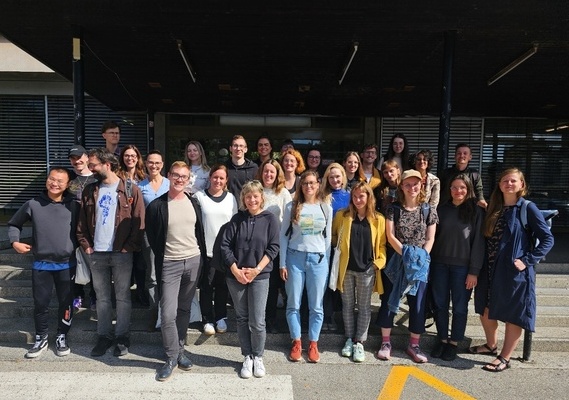
Participants of the fifth SIEF Summer School 2024
Postscapes Matter – SIEF Summer School 2024
Report of the fifth SIEF Summer School 2024 “Postscapes Matter”, 23 - 27 September, Zagreb, Croatia.
The fifth SIEF Summer School Postscapes Matter was held in Zagreb from September 23rd to 27th. It was hosted by the Department of Ethnology and Cultural Anthropology, Faculty of Humanities and Social Sciences, University of Zagreb, together with the project “Transformation of the Postindustrial City: Space, Community, and Work” (PostCity). The Summer School welcomed 24 students from some 15 countries who attended keynote lectures, participated in group workshops and thematic fieldwalk excursions. The Summer School was centred around the concept of -post, exploring the how, why, and for whom postscapes matter in a contemporary context as a lived experience, and historical or temporal condition. The event was organized by the local organizing team: Nevena Škrbić Alempijević, Petra Kelemen, Sanja Potkonjak, Kristina Vugdelija, Tatjana Enderić, Helena Tolić and Ivan Grkeš.
The first keynote lecture was held by Čarna Brković from the University of Mainz, Germany, who presented her research project on the activities of the Yugoslav Red Cross entitled Our political categories have always already been shared: (post)socialist histories of humanitarianism in Europe. Later on, a thematic fieldwalk named Railway station from another perspective was held by Bojan Mucko and Romana Pozniak from the Institute of Ethnology and Folklore Research. The fieldwalk consisted of an audio tour of the Zagreb Railway station and its surroundings that were and still are an important location for migrant movements in Croatia.
The second day started with the lecture Can the dying peasant speak? Inheritances of life in the Balkans' ‘green transition’ held by Ivan Rajković from the University of Vienna who discussed a case study related to the green energy transition in Serbia. After the lecture, a Postindustrial City workshop was held by Nevena Škrbić Alempijević, Petra Kelemen, Sanja Potkonjak and Kristina Vugdelija, members of the organizing team. The workshop was centred around the counter-mapping of selected urban industrial locations in Zagreb. After that, students participated in an urban tour Trešnjevka Mapping, led by the local guide, ethnographic devotee and enthusiast Vanja Radovanović who talked about the history of the biggest Zagreb urban district of Trešnjevka.
During the third day of the Summer School, Mitja Velikonja from the University of Ljubljana talked about neo-traditionalization in the post-socialist context of Slovenia in his lecture New Folklore – Neo-Traditionalism as a Cultural Logic of the Post-Socialist Transition. The lecture was followed by the workshop Research in Post-conflict Regions held by Ivona Grgurinović from the University of Zagreb, which problematized post-conflict topics from the field of anthropology of violence. Students then participated in a walk designed by the non-governmental organization Documenta: a center for dealing with the past, held by Alice Stranieri. The tour focused on the relationship between social memory and forgetting concerning the heritage of anti-fascism, the Holocaust memory, and the memory of the 1990s war events.
On the fourth day, Bojan Bilić from the University of Vienna gave a lecture entitled Making Books, Making Ourselves: The Pains and Pleasures of Writing Queer Lives after Yugoslavia, and spoke about his recent research of the Yugoslav and post-Yugoslav LGBTQ activism. Valentina Gulin Zrnić from the Institute of Ethnology and Folklore Research, Zagreb, together with Saša Poljak Istenič from the Institute of Slovenian Ethnology ZRC SAZU, Ljubljana, held the Lateral Thinking workshop where the students had the opportunity to imagine futures of urban locations using the lateral thinking methodology.
The last day of the SIEF Summer School was marked by the final session where the students discussed and summarized their impressions related to the programme. They presented a final review on the question of why postscapes matter and talked about how the concept has influenced their way of thinking and how it could be relevant for their future research. In a lively discussion, the students gave their opinions about the School programme and discussed ideas about the future topics of the SIEF summer schools. This year's Summer School confronted the students with the concept of -post innovatively and interactively, questioning the usual way of academic thinking and problem-solving. Lectures, workshops and urban tours provided the broader scope on the concept and its application for every participant, their research areas and backgrounds.
Helena Tolić and Ivan Grkeš,
SIEF Summer School PhD students and organizers

For more photos see PDF of the Newsletter.




